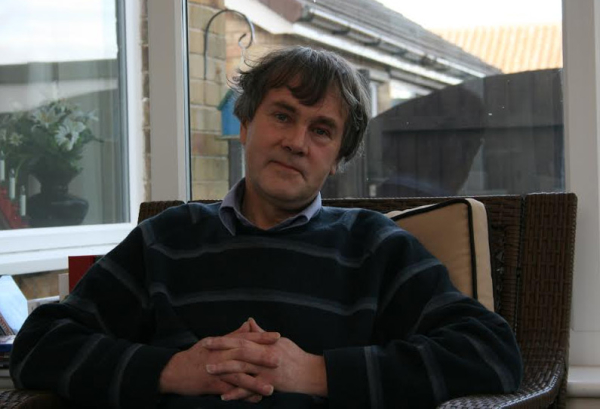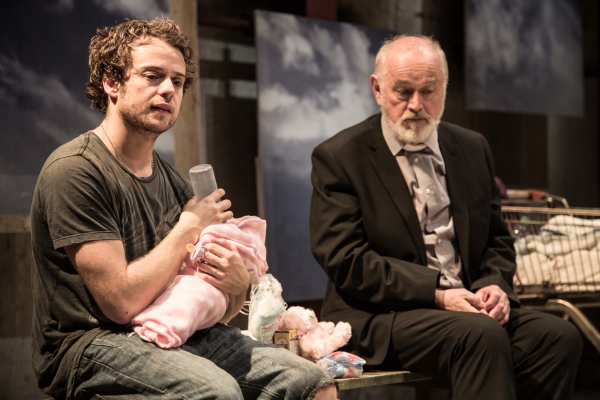Robert Holman: 'I'm not trying to be difficult'

Robert Holman, despite being described as an "unfashionable writer", has built up an enthusiastic following over a career spanning five decades. His play Jonah and Otto, which premiered in Manchester in 2008, has just received its London premiere at the Park Theatre.
What was the genesis of Jonah and Otto?
I'm not the sort of person who has great ideas. When I write I always doodle away around an idea until it takes shape. What happened with Jonah and Otto was that I wrote it for an actor, Andrew Sheridan, who was in a play of mine in Chichester. I thought he was terrific, so when the play was over I asked whether he was open to me writing something for him, and he said he was. So Jonah – which was a character name I asked him to come up with – was written for him.
It's about the meeting of two strangers
It is. Otto is a clergyman living on the coast who is 62 and not very content with his life. He doesn't feel so much that life has let him down as that he has let life down. Jonah is a young man of 26, whose girlfriend has gone to France because her father is ill. Jonah has not been able to get on the ferry so he is left behind on the south coast with their child. It's a bit of a conceit, but hopefully people will believe it.
Was Beckett an influence?
You're not the first person to ask that and I suppose the answer is that there is truth in it. I like Beckett a lot and Waiting for Godot is one of the great plays of the 20th century. But I don't think I set out to write anything that might be related to Godot. Like I said, my plays are doodled away and things come out of the mist.
What do Alex Waldmann and Peter Egan bring to the roles?
The thing about writing for actors is that, in the end, the play has to be bigger than the actors you write it for. The characters have to exist separately from me, they have to have a life beyond me. So it's wonderful seeing the play again with two very different actors. Even though they're of course saying the same lines, they are very different portrayals. They bring something of themselves to Jonah and Otto.

(© Jack Sain)
Were you tempted to rework the play?
I never go back. My plays are products of the moment. They represent what I thought and felt at that time. There is a bit of swearing in Jonah and Otto and it upset some people in Manchester. So I said to Tim [Stark, director] "I might take out the swearing". But he made a face that said 'don't you dare'. In the end I took my own advice and thought 'this was a product of a moment'. I left it and I'm so glad I did.
Your work often polarises opinion
Some people hate my plays; they are not to everybody's taste. I don't think I've ever sat through a production of one of my plays that somebody hasn't walked out of. But I don't do this deliberately. I'm trying to entertain people, I'm not trying to be difficult. I learned a long time ago that playwriting is about communication. It's about trying to communicate something, whatever that is, as clearly as I can. I am probably still learning how to do it.
What are your reflections on the Donmar's revival of Making Noise Quietly?
It was a remarkable time. With any revival, I always say to the director that I'm happy to do whatever is asked of me. I said the same thing to Peter Gill, thinking that I would end up doing little. But I found myself in the rehearsal room for most of those six weeks. In the first week, I would say "do you want me to come tomorrow?", assuming he would say no. But he kept said yes. And then a strange thing happened. Usually, I care passionately about plays when I write them, but then they go out there and I don't care at all. All I care about is getting the money. What I found with Making Noise Quietly is that I hadn't stopped caring, it had just laid dormant, and it came back with a vengeance. I began to care about the production and discovered those feelings I had when I wrote it were still in me. It was wonderful and terrible at the same time. It was wonderful because I enjoyed it, but terrible because old scars were raised.
How did you start playwriting?
I was brought up on a farm in North Yorkshire. My father was a conscientious objector during the war, so he had to go into a reserved occupation, which was farming. The writing started because I couldn't really do anything else. I read a lot as a child, I loved books, and when I was 14 I decided I wanted to be a writer. I wrote dreadful poems. I never told anyone about those. Eventually, I went to a grammar school to do A Levels. In the first term there, there was an option to do a drama course. I don't know why but I put my hand up for it, but I did. At the end of the course we had to write a play. I wrote it in an exercise book, which I filled cover to cover, and gave it to the teacher. I'd never been particularly clever, and wasn't one of his favourites, but a few days later he was waiting for me at the school gate and invited me to dinner. Later he went to my parents and told them I should go to London and be a writer.
What's currently on your desk?
I've just finished another two-hander. I wrote it initially for Matthew Tennyson, who was in Making Noise Quietly. I knew I wanted to write a play set in London, and he is a Londoner. I asked him to take me to his favourite place in London and he took me to Highgate Cemetery, which prompted the idea. I also wanted to have another go at writing for Andrew Sheridan, so he plays the other character. It will premiere next year.
What's your proudest achievement as a dramatist?
My proudest achievement is that I am still trying to do it 40 years later.
Jonah and Otto continues at the Park Theatre until 23 November 2014










